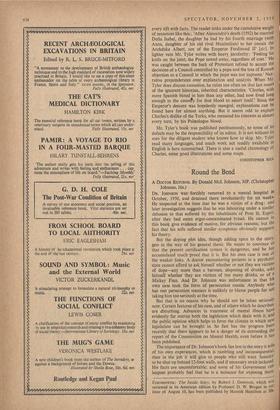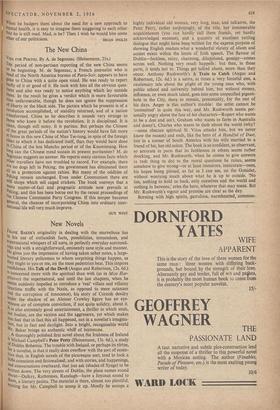Round the Bend
DR. JOHNSON was forcibly removed to a mental hospital n October, 1950, and detained there involuntarily for six weeks He suspected at the time that he was a victim of a drug : ant later investigation suggests that he was labouring under a simila delusion to that suffered by the inhabitants of Pont St. Esprit after they had eaten ergot-contaminated bread. He cannot this book give evidence of motive, for obvious reasons; but th fact that his wife suffered similar symptoms obviously support his theory.
But the doping plot idea, though adding spice to the story gets in the way of his general thesis. He wants to convince ti that the present certification system is dangerous, and he ha accumulated much proof that it is. But his own case is one the weaker links. A doctor encountering patients in a psychoti' state cannot afford to ask himself whether or not they are victim of dope—any more than a barman, disposing of drunks, ask himself whether they are victims of too many drinks, or of Mickey Finn. And Dr. Johnson was unfortunate in that hi own case took, the form of persecution mania. Anybody win has met persecution maniacs is unlikely to blame people for n0 taking him too seriously at the time. But that is no reason why he should not be taken serious': now. Certain features of his case, and of others which he describes are disturbing. Advances in treatment of mental illness havi evidently far outrun both the legislation which deals with it, ant the public opinion which helps to form the climate in which net' legislation can be brought in. So fast has the progress beer recently that there appears to be a danger of its outmoding thl report of the Commission on Mental Health, even before it ha' been published. The importance of Dr. Johnson's book lies less in the story it tell: of his own experiences, which is rambling and inconsequential than in the jolt it will give to people who still want 'lunatics to be shut up behind 12-foot walls, and if necessary strait-jacketed His facts are uncomfortable; and some of his Government col leagues probably feel that he is a nuisance for exposing them EISENHOWER: The Inside Story, by Robert 1. Donovan, which Wit` reviewed in its American edition by Professor D. W. Brogan' in mu issue of August 10, has been published by Hamish Hamilton at 30si
When he badgers them about the need for a new approach to mental health, it is easy to imagine them sniggering to each other that he is still mad. Mad, is he? Then I wish he would bite some



































 Previous page
Previous page